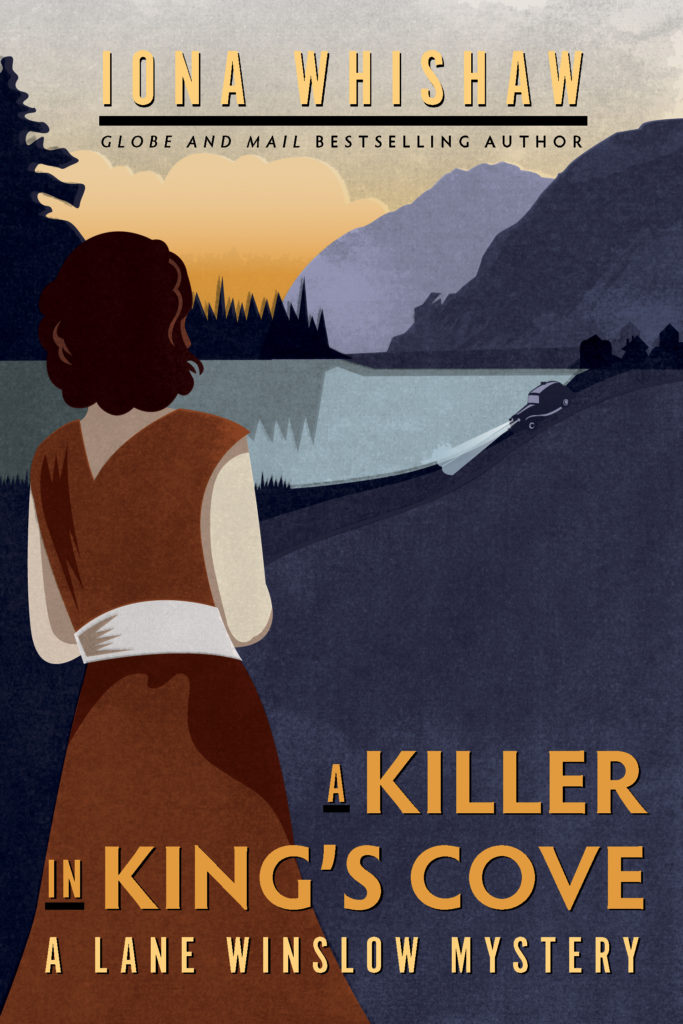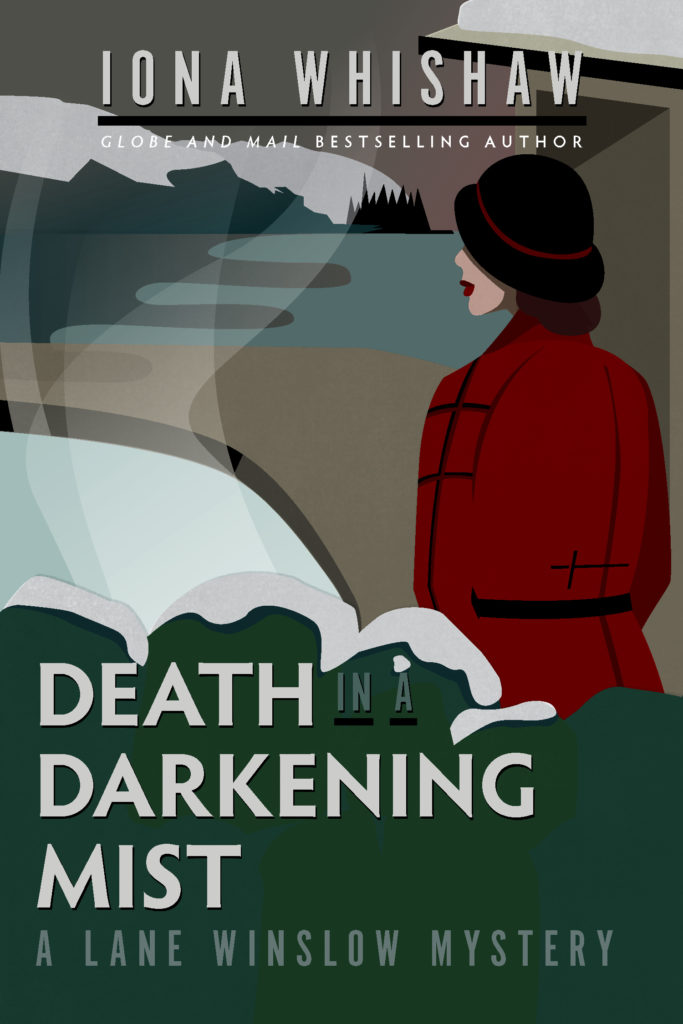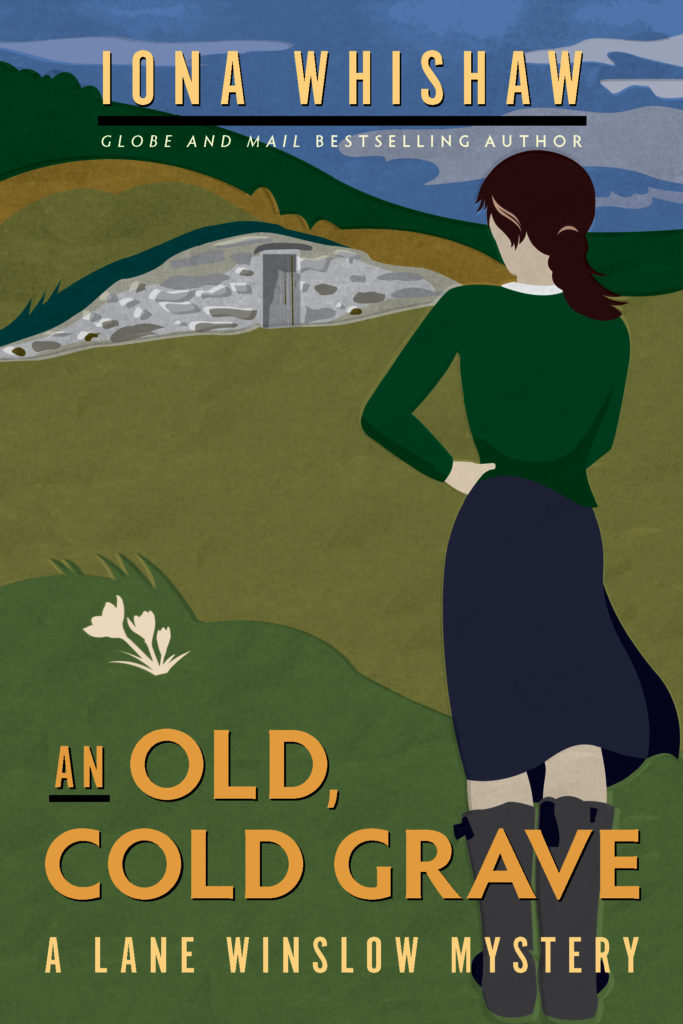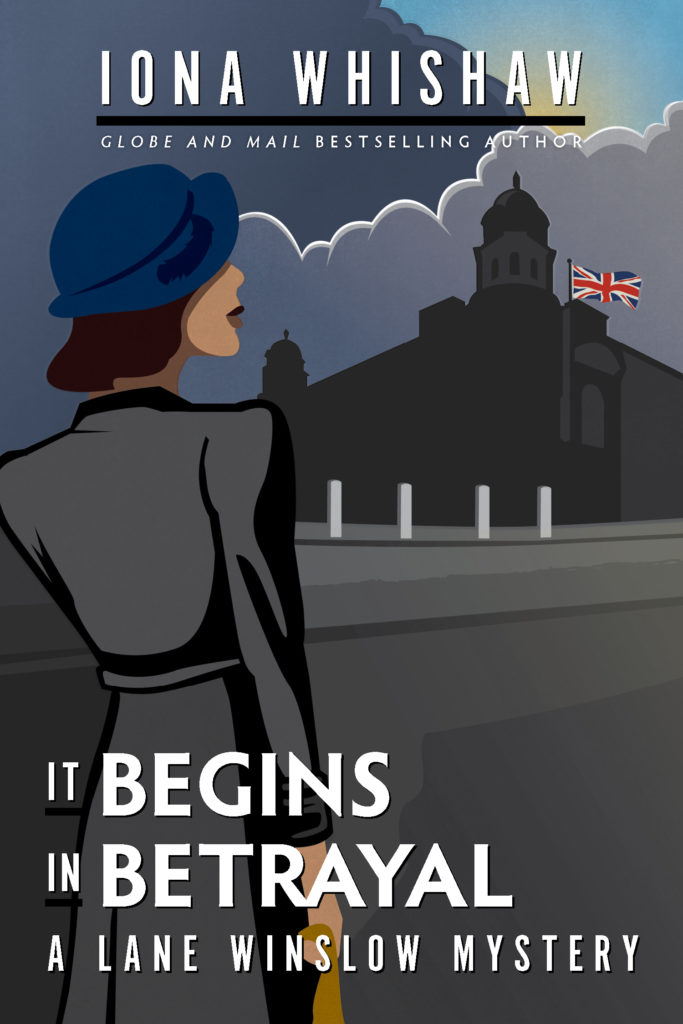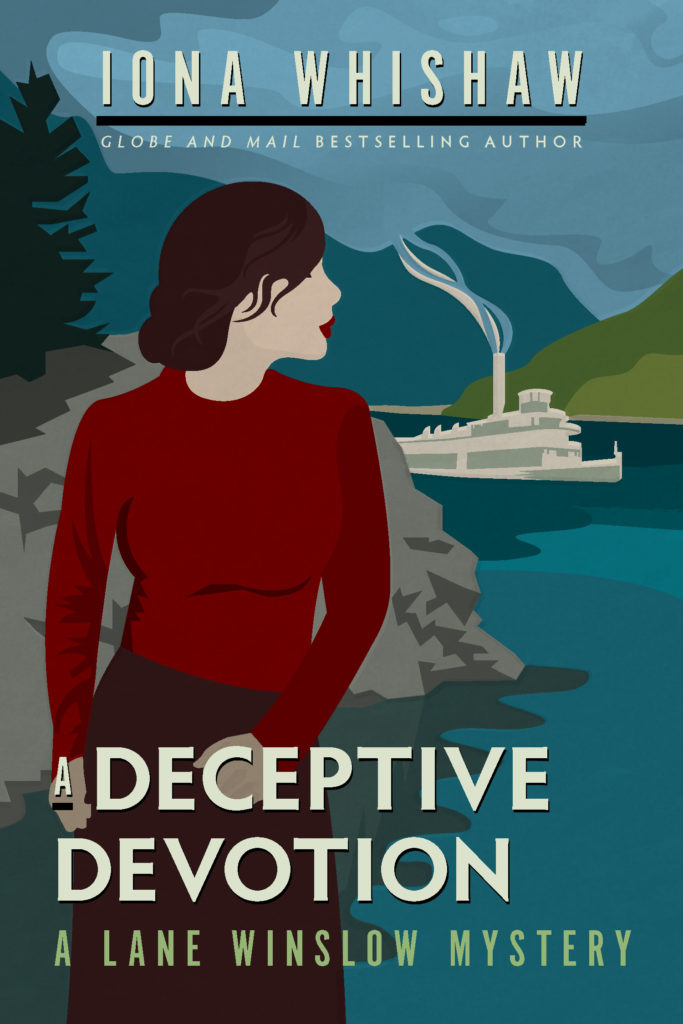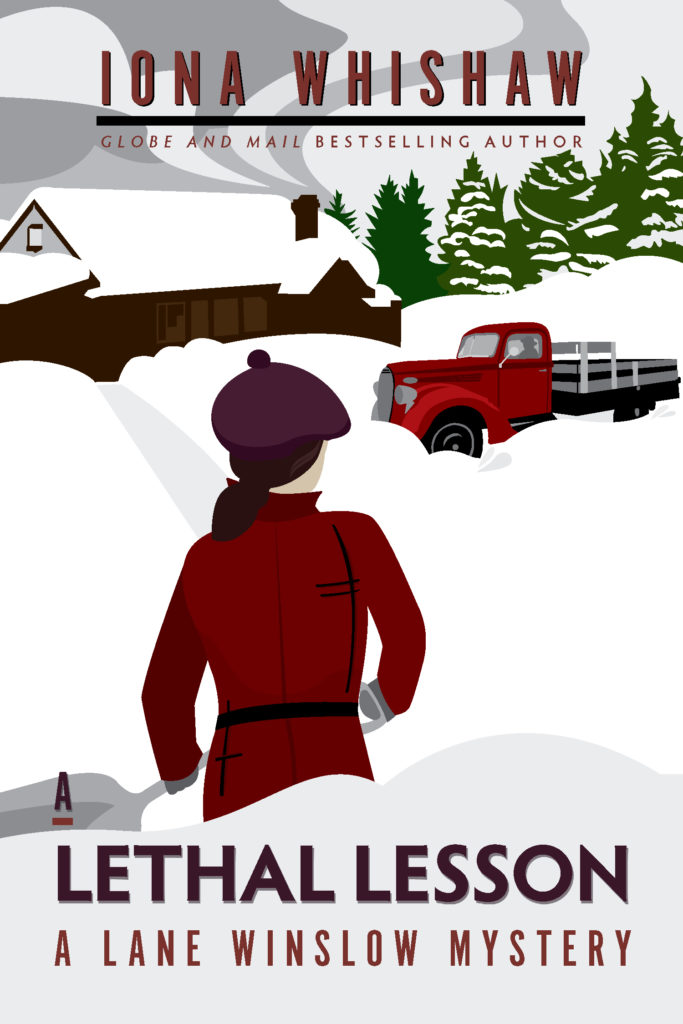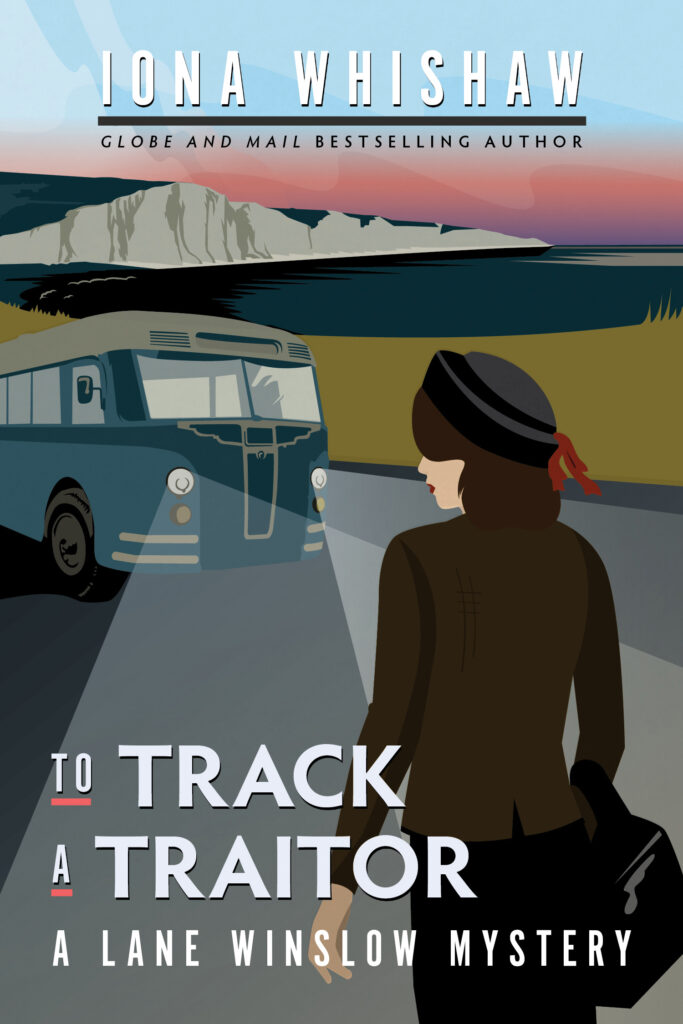Book Club Reading Guide
Iona is open to attending book club discussions either virtually or in-person (in the Vancouver area).
Please feel free to extend an invitation for her consideration!

General Reading Questions for the Lane Winslow Mysteries
- The character of Lane Winslow was inspired by Iona’s mother who spent some time as a wartime spy. Are there any characters in this series who remind you of someone in your own life? Why?
- Lane is bound by the Wartime Secrets Act and must keep her activities as a spy a secret for decades after the war, even from her husband. Famously, women were treated as mere wives and helpmeets by their husbands, who never learned how brilliant their wives had been in perceived “male spheres.” How difficult would it have been to be the woman in these marriages? Do you think you could keep a secret like that in your own life?
- We may be biased, but we think that this series would make a pretty great TV show. Who would you cast as Lane, Darling, and Ames? What about Kenny and Eleanor?
- Certain scenes and even major plot lines in this series have been inspired by questions asked or comments made by readers and fans—for instance, we learn about the teenage years of the Hughes sisters in An Old, Cold Grave because a fan asked Iona about them at a reading, and Terrell rides a motorcycle because of a fan letter that Iona received suggesting he could provide expertise if she was so inclined to include one. If you could suggest a plot point for a new book in the series, what would it be?
- Lane gets herself into trouble just as often as she gets herself out of it. Are there scenes when you find yourself yelling at Lane “don’t do that!” or “don’t go in there!” or “wait for backup, Lane!” What personal strengths does Lane call on when she is in these situations?
- This series illuminates quite a lot of Canadian postwar history. Iona writes about Russian interference in Death in a Darkening Mist and A Deceptive Devotion, home children in An Old, Cold Grave, the National Unity Party in A Sorrowful Sanctuary, and the forced migration of the Sinixt people in Framed in Fire. What is the most surprising aspect of Canadian history that you’ve learned from Lane Winslow?
- This series has been praised for addressing social issues—racism, xenophobia, domestic violence, sexual abuse, feminism—that are still current today. What storyline were you most surprised to encounter in King’s Cove / Nelson in the late 1940s?
Download all the Reading Guides on this Page:
Reading Questions for A Killer in King’s Cove (#1)
- Lane Winslow has moved to Canada to settle into a quiet life after a very long war. Do you have family members that served in the war? Did your family come to Canada (or move to another country) following the armistice? How successful might they have been in actually “getting away” from their past?
- Before the actual fate of Jack Franks was revealed, did you suspect Lane of being guilty? Did you have any other working theories?
- This book shows the still very strong ties between the King’s Cove residents and the “old country” including the presence of a common character in “the colonies”: the remittance man. What are circumstances you could imagine that would lead a family to pay a member to move to the colonies and never come back?
Reading Questions for Death in a Darkening Mist (#2)
- During the war Britain mobilized the entire population to help with the war effort, in particular women. Lane’s skills in languages led her to be drafted into espionage. In this book there are flashbacks to one of Lane’s missions in 1943. If you had lived in this period, do you think you would have volunteered to work as a spy? What are some wartime jobs that would have been preferable?
- Andrews is a character who on the surface appears handsome, successful and even heroic, and was extremely popular and athletic as a teenager. He might be called “entitled” today. What are the ways that such easy success might not prepare a character for the challenges of real life, or real relationships?
- Lane rescues herself and Sylvia from a car about to go over a cliff. Darling later says to her, “You were very brave.” And she retorts, “It’s not in the least brave not to want to die.” What is the nature of “bravery” and what are some other ways that Lane might be called “brave”?
Reading Questions for An Old, Cold Grave (#3)
- When Lane calls to tell Inspector Darling about the skeleton in the root cellar, he represses the urge to say, “You’re seriously telling me you’ve found another body?” Imagine you’re a 1940s-era police inspector who has, for the third time in a few months, been informed that the attractive newcomer has found a body—how would you react?
- Iona delves into the history of home children in this book. Do you have any members of your family who came to Canada as children a result of this program? What might the long-term effect of such a removal be for children in those circumstanes?
- This is to some extent a story about love—between Mabel and Bob, Ames and Tina, Darling and Lane—but in every case the love leads to confusion. How does love pull people away from their comfort zone, or even their ethical zone, from their sense of who they are?
Reading Questions for It Begins in Betrayal (#4)
- Lane and Darling spend the bulk of this book in England while Ames solves a rather baffling case back in the Kootenays. Which case was more mysterious to you, as a reader? Did you have any working theories about either case?
- One of the themes in this book is the Greek notion of the “fatal flaw” in which a character trait eventually leads to a downfall, or things from the past reach out into the present, as if the ultimate fate of a person is “baked in” by early mistakes. It occurs in the story of the three sisters, and the spy, Jones. Does this reflect real life do you think? In what ways?
- At one point Lane contemplates whether her whole relationship with Angus Dunn had been “founded on lies.” In fact, nearly every circumstance in this book is founded on lies: Anthony lies to protect himself and his partner, Jones lies because he’s a double agent, Agatha lies to her sisters. How do these lies work to move the story, and how do they affect the individual characters who tell them?
Reading Questions for A Sorrowful Sanctuary (#5)
- The National Unity Party of Canada and the Sudetenland refugees are examples of two diametrically opposite groups co-existing at the same time in Canada. A blatantly Nazi party is a rather shocking piece of Canadian history but so is the fact of Canada allowing German refugees into the country when it was at war with Germany. How much were you aware of the history of these two groups prior to reading this book?
- In this novel Lane wonders if instead of running around helping solve crimes she should be at home working in her garden. In general, she is a terrible cook, she knows little of homemaking, and she spent the war working as a spy. How does Lane subvert 1940s gender roles in this book, and through the series in general?
- It is clear Lane and Darling are in love, but Lane, though terribly attracted to Darling, at the same time feels she has a lot to lose. What is she afraid of? How do you feel the relationship is going? What are some of the factors that might make them good together?
Reading Questions for A Deceptive Devotion (#6)
- There is an old expression, “the more things change, the more they stay the same.” The interests and activities of the Soviet Union play a big role in this book. At the time their espionage and subversion efforts were focussed on gaining knowledge of the atom bomb from the West. Do you see similarities in the continuing role espionage and subterfuge play in east/west politics today?
- Lane and Darling face enormous hurdles to making a life together, both emotional and circumstantial. One of them must give up where they live, both of them are very private people who do not open up easily. Darling has his work, but Lane is an intelligent, highly experienced person who must content herself somehow with no longer having the role she had during the war. How can these factors make them strong, and how might they undermine the relationship over time? Who has to give up the most?
- So far in the series Ames has ended relationships with Violet and April. Now he’s invited the inimitable Tina Van Eyck to Lane and Darling’s wedding. How do you foresee their relationship proceeding? Tina is another strong personality—what do you think it would take for this relationship to work?
Reading Questions for A Match Made for Murder (#7)
- This is the second instalment of the series where Lane and Darling have travelled away from King’s Cove only to find themselves involved in a mystery. Do you prefer Lane’s adventures when she’s surrounded by her friends and neighbours, or are you excited to see how she negotiates her relationships and challenges in this new setting?
- How does Darling’s previous admiration for Paul Galloway affect his instincts during the case in Arizona?
- Despite his attraction to Tina, Ames has a difficult time getting past some of the things he learns about her in his investigation. Were you surprised at this reaction from Ames? Did you expect better of him? What social pressures of the day would have been at work here?
Reading Questions for A Lethal Lesson (#8)
- By this time we all know what happened at the teacher’s cottage. There are suspects aplenty, and motives enough to suit them all. Who did you suspect and why?
- The rural one-room schoolhouse was an extremely important feature of early education in Canada and many parts of the US. What might be some advantages to education in one? What about some disadvantages?
- Kenny and Eleanor Armstrong are the bedrock of King’s Cove, which is a tiny community with fewer than ten families. Such communities can easily descend into dissensions, disputes, and even outright threats of violence, and yet the residents of King’s Cove seem to maintain a balance that never tips over. What is it about the role and personalities of the Armstrongs that helps this community keep its balance, when clearly there are natural potential points of friction among them?
Reading Questions for Framed in Fire (#9)
- In this book Lane and Darling are involved in cases that deal with both covert and blatant racism—in large measure the Vitalis and Terrell are treated as outsiders. What are the social factors that would have led people to treat others in ways that would not be acceptable today?
- The xenophobia and racism of the time would normally have pit Tom Simpson and Peter Barisoff directly against each other, and yet that does not happen in this story. Why do you think that is?
- How does Lane’s egalitarian view of the world find expression in this book?
Reading Questions for To Track a Traitor (#10)
- Along with a desperate and deadly spy story and themes of revenge, one of the strongest themes of To Track a Traitor is the mismatch and struggle in relationships. What are the elements in the lives of Lane and Diana that contribute to the antagonism in their relationship?
- Another theme that appears in many of the Lane Winslow mysteries is the reach of the past and its ability to affect events in the present; what are some examples of this in To Track A Traitor? How much, do you think, are our lives are affected by our own, or indeed our family’s past in real life?
- What is it in this story that has so outraged Darling’s sense of ethics?
